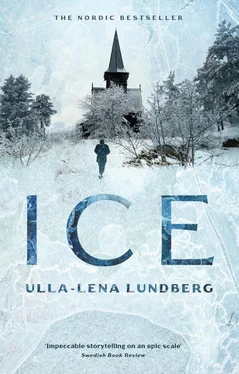When the dampers are closed and the tile stoves are warm, the air in the house is fresh and clean and tempers are calm. They have to teach Sanna to stay away from the hot metal parts, but she can sit with her back to the stove and enjoy the warmth, along with the cat. At least once a day, Sanna and Grandpa wrap themselves up in all their warmest clothes and take a walk on Church Isle. Grandpa talks about the ice freezing and his thoughts rush forward to the spring, when the ice will break up. “A first-class spectacle!” he assures Sanna. “Mother Nature demonstrating her grandeur and power.” He doesn’t think she understands what he’s saying, but how could she fail to understand talk about greatness and might!
She is not allowed to sit on Papa’s lap when he’s studying or when he’s instructing confirmation candidates. The latter turns out to be a great annual delight. The young people of the Örlands have a radiance that no shyness can disguise. They are just entering the most attractive period of their lives, but they are completely unaware of it. They feel ugly and hopeless as they sit there blazing with beauty, glowing with life. They’re embarrassed because they’re not polished and smooth but can’t disguise their charm as they beam and blush. They think everything they say is silly and stupid, although they’ve already demonstrated their inborn way with words—a dominant gene out here, thinks the pastor, who has read about Mendel and his peas.
Now he’s studying the catechism with them, and as he talks and instructs, the girls look at him to show that they’re paying attention. But otherwise they look down, for at least half of them are in love with him and will nearly perish of shyness if he speaks to them either before or after the class. Of course they like the pastor’s wife, who is nice and gives them hot tea when it’s cold out, and the little girl who opens the door a bit and stares at them though the crack is sweet, but imagine if the pastor was single! Imagine if he lived in a cold, untidy parsonage and dreamed of someone who could be his beloved and take care of him and love him for the rest of his life!
Then he might see their blushes for what they are, a sign of ardent devotion. Then he would see the happiness offered him, the boundless love! Now he stands there with his lovely hair and his wonderful eyes and his melting smile, blind as a statue, and comments on the tenth commandment. Thou shalt not covet they neighbour’s wife nor his asses or camels, and so on. But not a word about not coveting thy neighbour’s husband. Ha! And how dumb does he think they are when he asks, “What is it we mean by ‘covet’?”
“That you want something,” says one of the boys helpfully.
“Absolutely right. Sometimes it can also mean that a person wants something that he has no right to. Here the commandment helps us to draw boundaries. We should not covet anything that belongs to someone else. In this way, the tenth commandment is a follow-up to the seventh commandment, which tells us that we must not steal. The tenth commandment deals with more difficult and less unambiguous problems. The thief who steals knows that he shouldn’t. Legally, theft is a crime. If the thief is caught, he goes to jail. Coveting is not quite so simple. Today, for example, we do not consider a wife in a marriage to be her husband’s property, which people did in Moses’s day and even later. In modern times, adultery is not punishable by law, unless it leads to violence. Looking at your neighbour’s wife with desire is no crime. So why do you think the commandment is still valid?”
Now he’s captured their interest. Several of them have something to say, and he waits for a moment. As usual, it’s a farm boy who speaks up first, the fisherman boys later, if at all. The girls only if he calls on them. First Ollas’s Kalle. “Because it’s hard to see where it will lead.”
Good. And Grannas’s Markus pursues the thought. “If there’s a child, you don’t know for sure whose it is. Though you can guess.” There is murmuring and rustling in the room, as if everyone except the pastor knew of a particular case.
“Yes,” he says. “In that case we’re talking about adultery that goes badly for those involved and has consequences for others as well. But why does the commandment warn us even against desire?”
He sees that one of the girls gestures as if she wanted to say something. “Yes?” he encourages her. She blushes and looks out the window at snow blowing by in streaks and ribbons. “So that it won’t go that far,” she says.
“Absolutely right!” the pastor says. “Gretel has hit the nail on the head. We’re getting right to the heart of it. The commandments aren’t just a long list of prohibitions and don’ts and thou shalt nots that we’ve heard about no end since we were babies. Most of all, the commandments are about consideration and kindness. If we read on, we see how the Bible continues: ‘Ye shall walk in all the ways which the Lord your God hath commanded you, that ye may live, and that it may be well with you and that ye may prolong your days.’ On the surface, the commandments are about rules and prohibitions, but deep down they speak of the Divine benevolence that shines on God’s children.”
Although they’re not supposed to, they whisper and talk a little whenever he looks in the other direction. Nothing interests young people as much as the relations between the sexes. Their eyes are wide open, and they feel their way forward. Everything else is unimportant by comparison, old and boring and tedious, a lot of talk, whereas everything about their roles as women and men is a matter of life and death. The catechism speaks as if the only thing that matters is learning to know our saviour Jesus Christ, while the teachers and unwilling students know perfectly well that a good future love life is the only thing that matters. When older people sing “thy eternal bliss”, the youngsters sing “thy eternal kiss”. They perk up their ears if you say “love” but lose interest if what you’re talking about is God’s love. It’s a paradox that there are Bible classes for people at an age when their thoughts are full of sex, but at the same time you can see the sense in choosing an age when youngsters are most open and unguarded. People experiencing the bottomless despair of youth are prepared unconditionally to throw themselves weeping at the feet of Jesus.
Petter knows that he has priestly colleagues who exploit the depth of emotion and vulnerability of confirmation candidates to extort confessions and decisions that belong in the private sphere, a thing people learn to appreciate with increasing age and experience. In certain quarters, priests go so far as to coax forth statements that they find erotically stimulating. The pastor on the Örlands is on guard against any such impulse. He means to maintain a respectful attitude towards the feelings that run so high in young people.
He thinks about such things as he stands before his clutch of candidates. But most of all he thinks how, after his death, he is going to stand at the pearly gate and argue and plead until they have been let through, every last one!
The pastor’s wife wears a sunny smile and is friendly, and none of the girls who curtsey to her dream that she is keeping an eye both on them and on Petter. She looks at the beautiful Örlander boys with their smiles and smooth glances the way she might look at objects in a museum, so little desire she feels for anyone except her husband. It’s different for him. He has a tendency to confuse physical desire and spiritual passion. Maybe because they are related? But she pushes that thought away quickly. She is attentive to the transition from religiosity to eroticism, whereas Sanna, little as she is, is tempted by the atmosphere in the room and stands stock still, staring through the crack in the door as if waiting for the day when she will belong inside.
Читать дальше












